How Do You Interpret the Parable of the Wicked Husbandmen?
Jesus gives insight into the last days by giving a parable of what happened in former days. Who are the wicked husbandmen in this parable? What does it mean for today? This article takes a careful literary analysis of Jesus’ explanation.
The Parable of the Wicked Husbandmen – Matt. 21:33-46
Matthew recites a parable given by Jesus in front of the disciples as well as the Pharisees. Later, we get the inspired additions from the Joseph Smith translation to help flesh out the meaning.
So, what is the meaning of the Parable of the Wicked Husbandmen? Let’s dive in and find out!
For a review of the parable, see:
Before we get into the real heart of the matter – the wicked husbandmen – let us first clarify two other major aspects of the parable: the vineyard and the fruit. Knowing the meaning of these symbols will solidify beyond doubt the meaning of the husbandmen. If you prefer to skip straight to the matter, jump down to Who Are the Husbandmen?
What is the Vineyard?

First, what is the vineyard? The final verse (from the JST) says “which is the earth and the inhabitants thereof.” But, before we say that the vineyard equals the whole world, let us take into account two statements from the parable:
“And they caught him, and cast him out of the vineyard, and slew him” (v.39). Jesus is clearly “the son” of the householder, and he was cast out from his own people. He was an outcast of his people and not of the world at large, because he did not come to the world at large – he came to his people. Do not mistake, though, that for casting him out, he equated his people with the rest of the world.
The second statement comes from verses 40-41. Let’s use Mark’s version of the parable for those same verses (it’s more succint): “What shall therefore the lord of the vineyard do? he will come and destroy the husbandmen, and will give the vineyard unto others“ (Mark 12:9). Jesus’ commentary in the JST reveals exactly what the vineyard equates to by explaining: “And the kingdom of God shall be taken from them, and shall be given to a nation bringing forth the fruits thereof; (meaning the Gentiles.)” (v.53)
The Lord’s House – the Kingdom of God
The vineyard, then, represents the Lord’s house, which are his people or his church. It represents the Kingdom of God. We see this demonstrated again in the parable of the redemption of Zion in section 101. 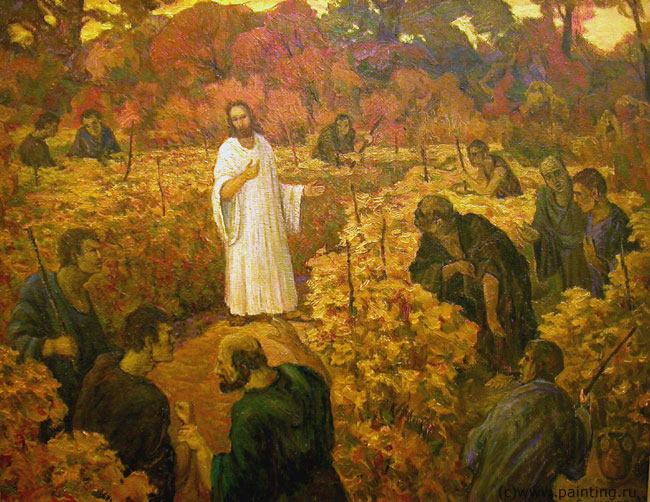
56 And go ye straightway unto the land of my vineyard, and redeem my vineyard; for it is mine; I have bought it with money.
The parable is about “redeeming Zion,” and in the parable, the word “Zion” is never mentioned. Instead, he says “redeem my vineyard.” So why does Jesus say in the Matthew parable that the vineyard “is the earth and the inhabitants thereof” (v. 56)? By considering the context, we catch that Jesus mentions “when he comes to reign in his vineyard,” and so conclude that when the Savior returns, the entire earth will be his kingdom. In other words, that is the day when the Kingdom of God will have filled the whole earth. To put another way, when Jesus actually comes to reign, those who are left will be those who are his people.
In addition to all of these points, this conclusion is the only possible interpretation in the context of producing fruit. The vineyard is what produces the fruit that the Lord is trying to harvest, which brings us to the next question. What is the fruit?
What is the Fruit?

By understanding what the fruit symbolizes in the parable, we gain greater clarity as to why the vineyard is in fact the Kingdom of God or his people. Since the vineyard produces the fruit which God wants to reap, we have to ask one simple question: Does the entire world (aka Babylon and its inhabitants) produce the kind of fruit that God wants? No way!
The fruit that God wants to collect are those who have become adopted sons and daughters of Christ by taking upon themselves his name. We are adopted by Jesus Christ through the baptism of fire and the baptism of the Holy Ghost (see What is the Baptism of Fire and the Holy Ghost? for more info). This is the event where we cross the threshold of “being saved from our sins,” and that is why the Lord compares it to “harvesting fruit” which he can “lay up unto himself against the season” (Jacob 5:13,18-19,29,71,76). His desire is to harvest the souls of men and women by saving them.
Who are the Husbandmen?
Now we can answer the question: who are the husbandmen? Let us recall the introduction to the entire section of this chapter, which begins in verse 23:
23 […] the chief priests and the elders of the people came unto him […] and said, By what authority doest thou these things? and who gave thee this authority?
This verse tells us who Jesus is speaking to when he delivers the parable of the wicked husbandmen. The end of the chapter confirms it (v.45).
45 And when the chief priests and Pharisees had heard his parables, they perceived that he spake of them.
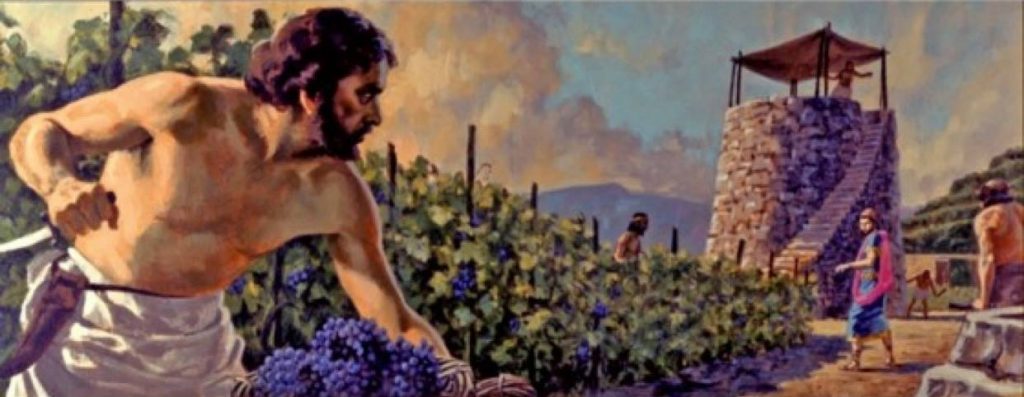
Husbandmen working in a vineyard act as stewards over the vineyard. (Note: other translations use words such as “leased out” or “rented to,” which also denotes a stewardship). That means they are in charge while the master of that vineyard is away. They have the authority to oversee the production of fruit and render it to the lord when he returns. To make the parallel, the husbandmen are the ones in charge of overseeing the Lord’s people. They get them to become the sons and daughters of Jesus Christ as mentioned above.
The Pharisees and High Priests Are Wicked Husbandmen
This makes perfect sense when we plug in the Pharisees, high priests, and elders of Jesus’ day. These men had the charge – the authority – to teach the people God’s law. This is why Jesus called Nicodemus “a teacher/master of Israel” (John 3:10). In fact, Matthew tells us that Nicodemus was as a Pharisee and a leader:
1 There was a man of the Pharisees, named Nicodemus, a ruler of the Jews (John 3:1)
By stating that Nicodemus was “a ruler of the Jews,” it does not refer to him being a political ruler. No! He couldn’t have been because the Romans were the political rulers. He was a religious leader, or “ruler,” of the Jews. The Pharisees and high priests (or “chief” priests) were these religious leaders of the Jews. With this in mind, it’s no wonder they were so angry over Jesus and his disciples trying to teach everybody. In their eyes, Jesus and the apostles did not have authorization to be the teachers/religious leaders. This gives so much more context to why they asked Jesus:
By what authority doest thou these things? and who gave thee this authority? (John 3:23)
If there is one thing that men always teach and learn, it’s “who’s in charge.” Who has the authority? That’s a drum we Latter-day Saints beat ad nauseum. There is good reason for that. God works within a hierarchy, but men usurp that authority whenever possible. These ancient leaders over the Lord’s people were no exception.
If this is true, then immediately we must begin making the necessary connections. Jesus spoke directly to and about the chief priests, the elders, and the Pharisees. These were the religious teachers and leaders of the Jews.
What Makes The Husbandmen Wicked?
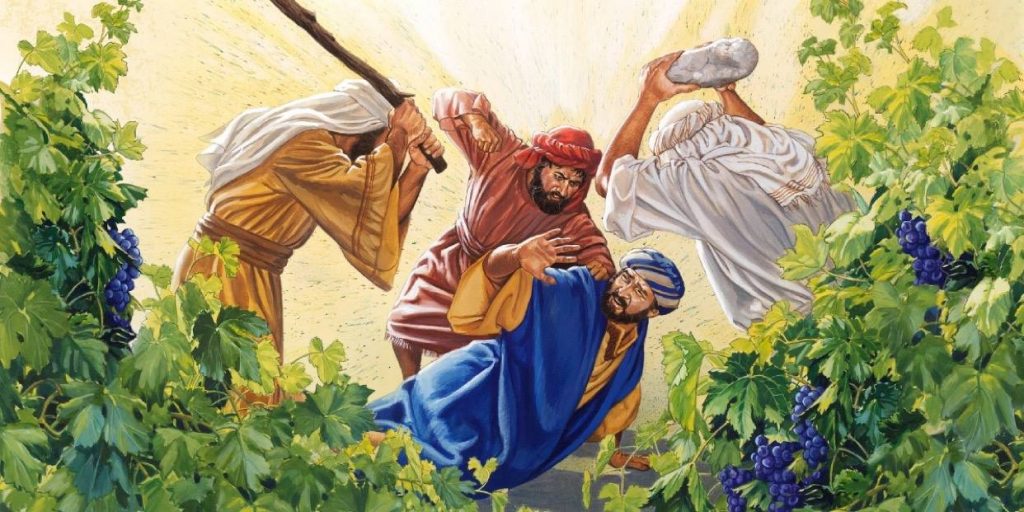
The parable only lists a few details on what makes these husbandmen “wicked.” What did they do to receive that label? Let’s examine the reasons:
35 And the husbandmen took his servants, and beat one, and killed another, and stoned another.
36 Again, he sent other servants more than the first: and they did unto them likewise.
37 But last of all he sent unto them his son, saying, They will reverence my son.
38 But when the husbandmen saw the son, they said among themselves, This is the heir; come, let us kill him, and let us seize on his inheritance.
39 And they caught him, and cast him out of the vineyard, and slew him.
Jesus sums it up to his disciples with one simple phrase: “those wicked ones reject me” (JST v. 51).
Jesus Explains Who the Husbandmen Are
The Husbandmen Reject the Son
When Jesus finished the parable, he perceived that the disciples “marveled” at what he had said. Who wouldn’t marvel at hearing someone call out their own religious leaders right to their faces?! Jesus told them in no uncertain terms that they were wicked husbandmen!
50 And now his disciples came to him, and Jesus said unto them, Marvel ye at the words of the parable which I spake unto them?
51 Verily, I say unto you, I am the stone, and those wicked ones reject me.
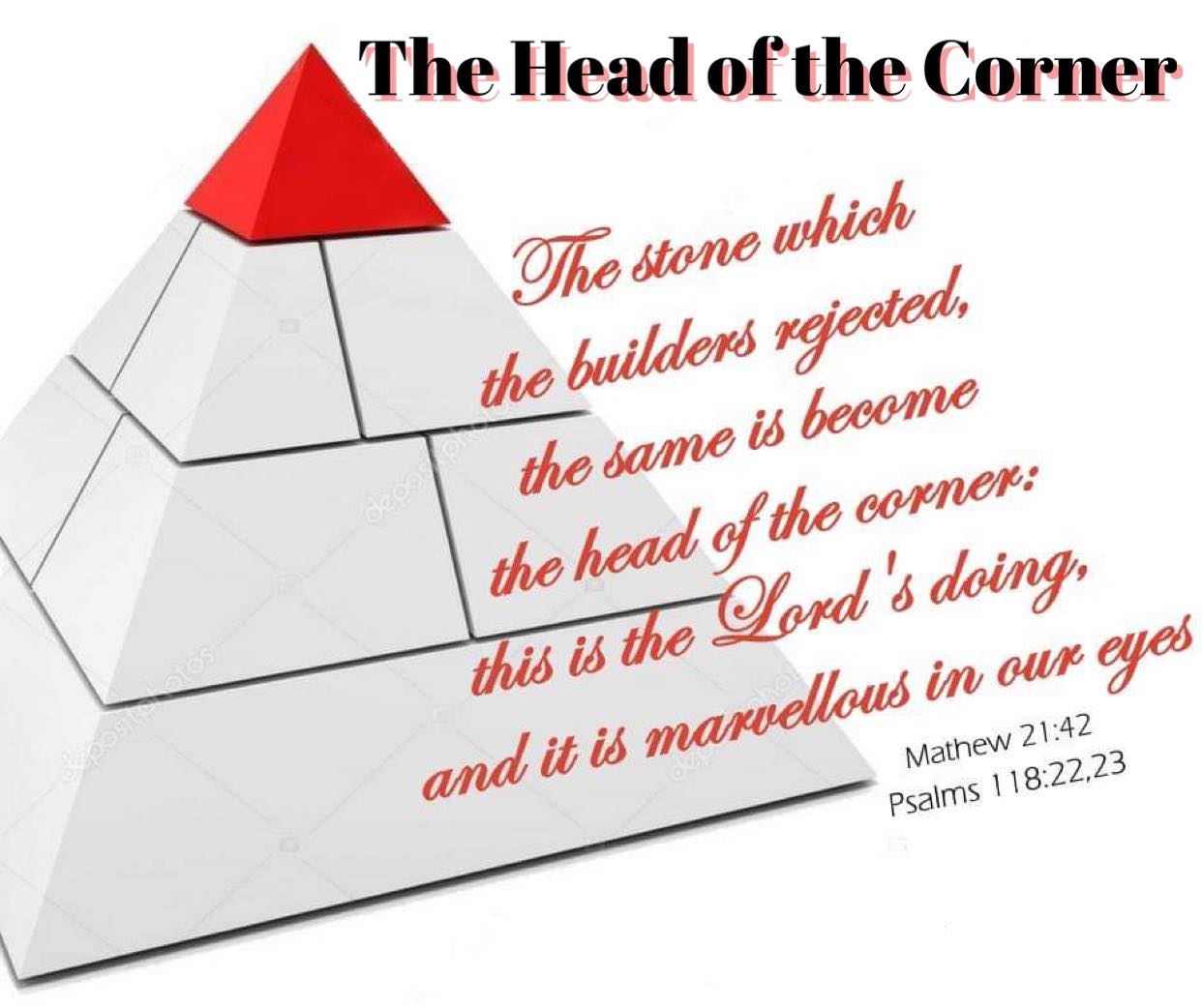
Jesus is that “head of the corner” mentioned in verse 42, “and those wicked ones reject [him].” Who are the wicked ones? The Pharisees, elders, and High Priests, etc. They were the religious leaders of the Jews – the Lord’s people. These men had the authority to teach and lead the people. They also had access to Jesus as well as the opportunity to receive the fullness of the gospel from him. They didn’t have it themselves even though they thought they did – important note as we make parallels to our day)!
52 I am the head of the corner. These Jews shall fall upon me, and shall be broken.
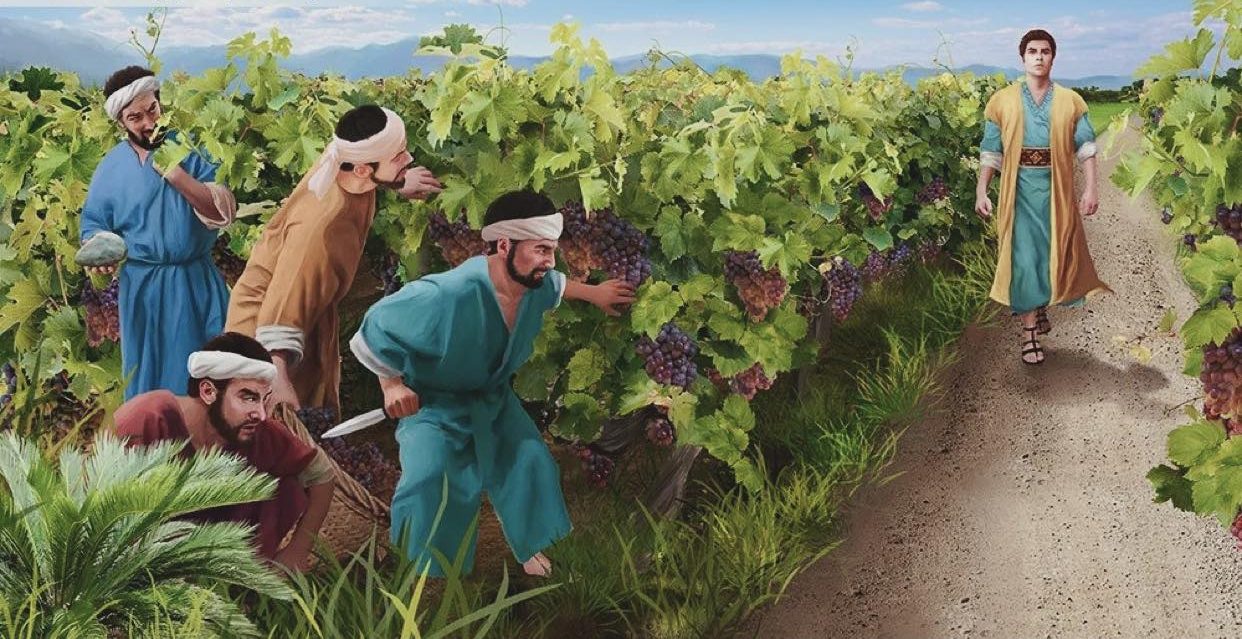
This verse explains the meaning of verse 44 of the parable. The Jews (especially the leaders) fall upon Jesus (meaning they persecute, arrest, and crucify him). This proves their eventual destruction. This is like the Jews falling from the lofty heights of their kingdom and landing on the capstone of a pyramid, dashing them to pieces. The pyramid capstone is the meaning of the phrase “the head of the corner.”
New Husbandmen – The Kingdom Taken from the Jews and Given to the Gentiles
53 And the kingdom of God shall be taken from them, and shall be given to a nation bringing forth the fruits thereof; (meaning the Gentiles.)
Next, Jesus expounds on what he meant earlier in verse 43: that the Gospel will be taken from the Jews and be given to another nation or people. It says “the gentiles,” which is a broad term, but it’s referring specifically to those gentiles who actually receive the kingdom in the last days. That would be the Latter-day Saints. Joseph Smith confirms this in Section 109:60:
60 Now these words, O Lord, we have spoken before thee, concerning the revelations and commandments which thou hast given unto us, who are identified with the Gentiles.
Which Gentiles?
As a side note, some people may argue that the term “Gentiles” used here might refer to A.) the gentile nations or the nations of the world in general, or B.) the Gentiles who received the gospel after Christ’s death and before the “Great Apostacy.” A close look at several clues will prove that it is neither – we see reference to “the last days” and “when the Lord comes” (canceling “B”). And we read that they receive the kingdom – meaning they shall receive the gospel (canceling “A;” see v. 43, JST v. 53).
Considering these clues, it specifically points to those Gentiles who would 1.) receive the kingdom of God (aka the fulness of the Gospel) and 2.) in the last days just before the Second Coming of Jesus Christ. Only two groups of Gentiles have had the kingdom “given to them:” the Former Day Gentiles, and the Latter Day Gentiles. The Latter Day Gentiles are us – the Latter-day Saints!
55 And when the Lord therefore of the vineyard cometh, he will destroy those miserable, wicked men, and will let again his vineyard unto other husbandmen, even in the last days, who shall render him the fruits in their seasons.
56 And then understood they the parable which he spake unto them, that the Gentiles should be destroyed also, when the Lord should descend out of heaven to reign in his vineyard, which is the earth and the inhabitants thereof.
Therefore, the Gentiles referred to in this parable are the Latter Day Gentiles (Saints) and not the Former Day Gentiles (Saints), and especially not the “gentile nations” in general. (For further reading on this topic, see Who are the Latter-Day Gentiles in the Book of Mormon?)
Making a Parallel Between Those Husbandmen and Now
That brings us back to where we were:
54 Wherefore, on whomsoever this stone shall fall, it shall grind him to powder.
The imagery of the capstone of the pyramid (which represents Jesus Christ) receives more explanation. This verse is an expansion of the earlier statement in the parable (verse 44). Let’s review verses 42-44 for context:
42 Jesus saith unto them, Did ye never read in the scriptures, The stone which the builders rejected, the same is become the head of the corner: this is the Lord’s doing, and it is marvellous in our eyes?
43 Therefore say I unto you, The kingdom of God shall be taken from you, and given to a nation bringing forth the fruits thereof.
44 And whosoever shall fall on this stone shall be broken: but on whomsoever it shall fall, it will grind him to powder.
Pay close attention to the way Jesus unfolds this information. If we don’t catch it, we cannot make proper sense of the last two verses (55-56).
Jesus tells “those wicked ones’‘ – the religious leaders – that not only will he take the gospel from them, but that they will be “broken to pieces” aka destroyed. While the metaphor has multiple levels of meaning (not enough time to include all of them here), the first level of meaning is that Jesus is foretelling of their destruction, as already noted above (he also expounds on their destruction in Matt. 24 – just three chapters later).
The Parallel – Partial Rewording of v. 43-44
With this in mind, let’s reword verses 43-44 for clarity:
43 The gospel will be taken from you and given to the Gentiles (first the “Former Day” Gentiles, then the Latter Day Gentiles – aka the Latter-day Saints).
44 You will be destroyed: but on whomsoever this stone shall fall, it will grind him to powder.
Verse 43 refers to the present state as well as the future state of the Lord’s people – two different groups that have the same results.
What about verse 44? It does the same thing. The JST clarifies this. Notice how Jesus nearly restates verses 43-44 in his explanation:
53 And the kingdom of God shall be taken from them [the Jews], and shall be given to a nation bringing forth the fruits thereof; (meaning the Gentiles.) [both the Former-day and the Latter-day Saints]
54 Wherefore, on whomsoever this stone shall fall, it shall grind him to powder.
Jesus explains that the Gentiles who receive the kingdom in the last days would also be destroyed, just as the Jews would be destroyed. The imagery of the a giant pyramid capstone falling out of the sky and landing on a bunch of people is representative of the coming of the Lord – as demonstrated later on. That “day of the Lord” is the time (or “day”) of destruction prior to his coming.
Now the wording makes more sense. Jesus was subtly pointing at a comparison which is parallel between the two peoples/situations (“A” has the kingdom, “B” gets the kingdom next; “A” destroyed, “B” destroyed next). Let me offer the complete paraphrase to demonstrate:
The Parallel – Complete Rewording of v. 43-44
43 The gospel will be taken from you and given to the Latter-day Saints in the last days.
44 You will be destroyed, but likewise shall the Latter-day Saints be destroyed [and for the same reasons].
Side Note – Introducing the Isaiah Connection
With this understanding, we can better plug into the book of Isaiah – it matches this parable almost perfectly. What happened in former days will happen again in the latter days.
This parallel in Matthew 21 is extremely important to catch in order for us to understand the next few chapters following it. He maintains the exact same context and adds more clues as he unfolds chapters 22 through 24. This is especially true once we get into chapter 23 where Jesus expounds on the ways which the Pharisees/High Priests/etc. are “the wicked husbandmen” who reject him. The following chapter immediately foretells of the destruction of both Jerusalem and the latter day peoples (chapter 24). And there it is – the parallel comparison again.
In other words, chapter 23 is just as much a parallel to our day as chapter 24 is. Jesus has established that connection not only between the destruction of his people in his day and the destruction of his people in our day, but also the reason for it: namely, the wickedness of his people, and those starting at the very top – the religious leaders. The husbandmen of his day parallel the husbandmen of the latter days.
The Latter Day Husbandmen Are Destroyed
And that brings us back to JST Matt. 21:
55 And when the Lord therefore of the vineyard cometh, he will destroy those miserable, wicked men, and will let again his vineyard unto other husbandmen, even in the last days, who shall render him the fruits in their seasons.
The parallel comparison is now expanded to include the destruction of the Latter Day Gentiles, just as the wicked Jews were, and for the same reasons. Jesus even says “those miserable, wicked men” referring to the husbandmen over the Gentiles. That matches the description of the husbandmen over the Jews (verses 41 “miserably destroy those wicked men” and JST 51 “those wicked ones reject me”).
The Husbandmen Today
So, which men are these, exactly? The husbandmen! The stewards over the vineyard – over the Lord’s people. They are the religious leaders! This is clarified by the very next statement:
“…and will let again his vineyard unto other husbandmen, even in the last days, who shall render him the fruits in their seasons.”
Pay attention to the phrase “let again.” This means that other husbandmen became the stewards of the vineyard before this moment. When? That occurred when the Apostles became the stewards and the Gentiles received the gospel, and the Jews and their leaders lost it. So here in verse 55, Jesus says the same thing will happen again! The Latter Day Gentile stewards lose the kingdom and yet other husbandmen receive it! The last days will be a repeat of the days of Jesus.
The idea here is that the stewards will be evil or wicked again and will reject him again, just as the Pharisees did. This is the parallel he is making between the two groups of people. In other words, Jesus takes the kingdom from the Jews and gives it to other stewards, and then he takes the kingdom from the latter-day stewards and gives it to yet other stewards “when the Lord of the vineyard cometh.” So, the timing and context is unmistakable. This occurs at the day of judgment, or the great and terrible day of the Lord (aka the fulfillment of Matthew ch. 24).
Upon My House Shall it Begin – D&C 112
This idea shines more light on the statement by the Lord in D&C 112:23-26 and D&C 64:39:
23 Verily, verily, I say unto you, darkness covereth the earth, and gross darkness the minds of the people, and all flesh has become corrupt before my face.
24 Behold, vengeance cometh speedily upon the inhabitants of the earth, a day of wrath, a day of burning, a day of desolation, of weeping, of mourning, and of lamentation; and as a whirlwind it shall come upon all the face of the earth, saith the Lord.
25 And upon my house [read: my vineyard/my people] shall it begin, and from my house shall it go forth, saith the Lord;
26 First among those among you, saith the Lord, who have professed to know my name and have not known me, and have blasphemed against me in the midst of my house [read: in the midst of my vineyard/my people], saith the Lord.
The “day of wrath” is specifically “the great and dreadful day of the Lord,” and that phrase (from Malachi 4:5) appears several times throughout scripture. Consequently, when the scriptures speak of destruction that occurs “when the Lord comes,” they do not mean “when the Lord is literally descending out of heaven” even though the words may make it sound that way. The earth undergoes great destruction prior to that moment in time. While our current focus does not grant us sufficient time to go into detail on this matter, we should at least understand that the “coming of the Lord” occurs in multiple stages: First, his coming in judgment to destroy the wicked. Second, his coming in mercy to gather his people. And finally, his coming in glory to reign on the earth.
The Husbandmen Have Blasphemed Amidst the Lord’s People
With that context out of the way, let’s address the end of the passage in section 112. Who exactly has “blasphemed against the Lord” in the midst of his house/vineyard/people? He said who: those who professed to know him/know his name. No one professes to know his name more than those stewards who oversee his people – by their own assertion and by the assertion of the people who have believed them. They have the keys! They’re the ones who know Jesus Christ! They are the ones who commune with Him and tell us His will! At least, that’s what they have claimed, it’s what they have professed.
The Husbandmen Are Liars and Hypocrites
Now D&C 64:39 makes more sense:
39 And liars and hypocrites shall be proved by them, and they who are not apostles and prophets shall be known.
Could it be any clearer? The context of 64:39 is “when the Lord reestablishes Zion” (v. 37-38). And who were the “liars and hypocrites” in Jesus’ day as pointed out in Matthew 21 and 23? The Pharisees and Sadducees – the religious leaders of the Lord’s people!
Good Husbandmen Render The Lord the Fruits
Back to Matthew 21:
The husbandmen in the parable are the stewards over the vineyard – the religious leaders over the Lord’s people. And Jesus said that “when the Lord comes” other husbandmen who shall render him the fruits will replace them. This means that the wicked husbandmen are not rendering unto Christ the fruits of the vineyard yet again – in fact, they also cast out and even slay the true servants who the Lord sends unto them. They did it before (see verses 34-39), and that made them “wicked.” Since Jesus informs us in verse 55 that the husbandmen over the vineyard will be “miserable, wicked” again, then we can conclude that it’s for the same reasons as before. Remember that the transition from then until now is a complete parallel or repetition.
“But I thought that the leaders of the church WERE the true servants of the Lord!“
Exactly! That’s why the Lord will be so extremely angry with them! That’s the entire point of this parable! The husbandmen are wayward or wicked!
Conclusion – Repeating the Past in Our Time
This brings us to the end of the JST portion of Matthew 21:
56 And then understood they the parable which he spake unto them, that the Gentiles should be destroyed also, when the Lord should descend out of heaven to reign in his vineyard, which is the earth and the inhabitants thereof.
Now the disciples understood the parable! Namely, that the Latter Day Gentiles receive the same fate – destruction falls upon them just as it did the Jews and their leaders – when the Lord would come (aka the great and dreadful day of the Lord). By adding the word “also,” Matthew reiterates the parallel comparison between the group of husbandmen of Jesus’ time and the husbandmen of the latter days. The Jews and their religious leaders were destroyed. In making it a parallel for our day, the Jews become a metaphor to represent the leaders of the Latter Day Gentiles (Latter-day Saints and their leaders). Both groups consider themselves the Lord’s people; both groups have access to the truth and are responsible to live up to it. Additionally, the comparison extends from the leaders of the flock to the Lord’s people/the flock in general.
Reinforcing the Isaiah Connection
This is the theme throughout the entire book of Isaiah. As the head, so the tail; as the leaders, so the people. In other words, what we get from these few chapters of Matthew (21-24) is a mini representation on the entire message of Isaiah! Matthew is giving a key here that we can use to unlock Isaiah’s message with more clarity:
1.) Making parallels between Isaiah’s time to Jesus’ time to the latter days (our time now).
2.) Specifically making parallels between both the leaders and the people of all three time periods.
While that’s an oversimplification of Isaiah’s message, it’s a key starting point to begin to unlock the majority of the book. This is especially true once you plug in Jesus’ statement about the new husbandmen (the good ones):
“…and will let again his vineyard unto other husbandmen, even in the last days, who shall render him the fruits in their seasons.”
Isaiah frequently refers to these new husbandmen – the new servants – who come forth at this day of judgment and destruction.
For now, this concludes our examination of the meaning of the Parable of the Wicked Husbandmen. Don’t forget to check out Does God Allow a Prophet to Lead Us Astray for more in-depth study on this topic!
Comment Below!
Please let me know your thoughts in the comments below!














